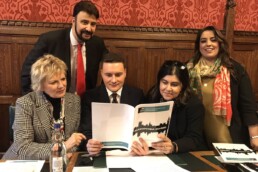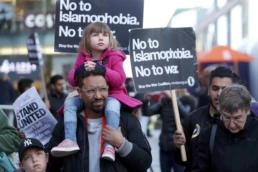The recent uproar around a “white Christian child” being “forced into Muslim foster care” has quickly revealed itself (as if we should have ever doubted it) to be a whole lot of hogwash. There are questions around whether the child is even “white Christian” – not only is it unverifiable (to protect identity of the child), but because her maternal grandmother is a “non-practising Muslim” whose first language is not English, and expressed a desire to “return to her country of origin and care for the child there.” Of course, these facts don’t serve a race-baiting section of the media, nor the fact that the mixed race (and not simply Asian) fostering family in question were temporarily looking after the child whilst the authorities were determining the suitability of being permanently placed with her grandmother. The child was not forced to give up anything, nor forcibly placed anywhere, and the court was satisfied that the temporary placement met the child’s needs. We’ve been more recently informed that the child, having moved on, had a “warm relationship” with her foster carers and now “misses them”. Predictably, the Times relied on the ignorance of some of its readers by pointing out that a woman from the fostering family wore a face-veil outside, hoping for readers to incorrectly assume that this also would occur within the confines of her home as well. And as for the teaching of Arabic, if the other children were privy to the same academic opportunities, how exactly was this a negative?
This isn’t a Muslim grievance. In his public inquiry into British newspaper ethics in 2011, Justice Leveson outlined: “The press provides an essential check on all aspects of public life. That is why any failure within the media affects all of us.” John Biggs, the mayor of Tower Hamlets, spoke of the sensationalist nature of the reporting and pointed out that the “child seemed to be in a settled and happy position.” Sir Martin Narey spoke of “disastrous” consequences to fostering, and the Guardian identified the “incendiary” nature of the claims. It wasn’t a simple as the Times and Mail presenting a ‘skewed portrayal’ but more of an outright lie with the apparent intent to further an insidious agenda to demonise Muslims and paint them as a threat. The anticipated and rash inputs of former bishop of Rochester Michael Nazir-Ali and Trevor Phillips, a former chair of the equality watchdog who branded the council’s actions “worse than idiotic and more akin to child abuse” simply added to ruckus – it was clear to see who has a Muslim bee in their bonnet.
Debatably, the media’s audacious spectacle is nothing short of early Nazis machinations or the early stages of many other atrocities that have taken place in near history. What makes going-ons in the UK particularly interesting is that this is not being sketched out in some murky backroom with Cuban cigars, chalkboards, colonial maps and chesterfield armchairs but in Rupert Murdoch’s offices which cultivates the likes of Fox News which has already, as Ed Miliband boldly puts it, ‘played a major role in polluting the well of public conversation in the US, stirring division and hatred.’ If right-wing killings on both sides of the Atlantic are already transpiring, how long will it be until this turns into the disaster we all dread and from which we as a society might be unable to recover?
Like the Trojan horse debacle in Birmingham, one unnamed source (in the council) seems to have been sufficient to wage a full-scale misrepresentation by right-wing and racist sections of the press, driven by ideologically motivated agendas. The Prophet spoke of wicked entities, who mix more than a hundred lies with one word of truth, and relevantly, during his time as prime minister, Tony Blair described the Mail as taking “what there is that is true and then turn it round into something that is a total distortion of the real truth.” Clearly, it takes one to know one.
In addressing rising anti-Muslim sentiment, not only in the UK but across the English-speaking world, there is an obvious point that we are at liberty to consider: is there a primary vehicle driving such sentiment, and if so, what is it? Of course, terrorism and other criminal acts by those professing the Islamic faith do little to help, but even then, social perceptions around these events are not shaped merely by their occurrence but by the way they are presented. According to a University of Cambridge/ESRC Roundtable held at the House of Lords, mainstream media reporting about Muslim communities is contributing to an atmosphere of rising hostility towards Muslims in Britain. Evidently, sections of the mainstream media has been the greatest contributor to growing resentment and attacks, and not by merely reporting the news but by completely skewering it for political purposes. The work of those like Miqdaad Versi which has been to challenge inaccurate reporting in the media is commendable and evidences the brazen mistruths some sections of the media is willing to perpetuate. So, the agitators are known, they operate powerfully and in clear sight. They are significant drivers in rising animosity towards a section of British society, heightening tensions that threatens the lives and security of its members, and this necessitates pushback; a major objective of ours ought to be inhibiting the demonisation of Muslims and overcoming all impediments to their full participation in public life, as well as to secure equal treatment as citizens.
So where do we stand now? Amongst politicians, the former Labour leader Ed Miliband notably stands out for his courageous stance in facing down the behemoth that is the Murdoch empire, which stretches across continents, something that the rest of Labour seemed to have more recently picked up on. In the US, Fox News, along with other right-wing outlets, was instrumental in galvanising swathes of Americans, playing into the worst of their fears and prejudices, which ultimately led to the presidency of Trump. There are a number of things that we can do to add to the chorus that might compel change. Firstly, lobbying local politicians to continuously raise this issue in parliament, and even where one’s local MP might be not be a member of Labour, support a cross-party approach. Secondly, efforts such as that of Versi that directly challenges reporting requires encouragement and support, people with the appropriate skill-set might consider donating some time or energies to his campaign. Thirdly, supporting legal challenges to clearly unfair reporting; of course, some nuance is needed: if a Muslim has put themselves in a tenuous situation by saying something obviously problematic and then expects backing, then that’s simply foolish. I acknowledge this can become quite relative and complex, I only intend to make a straightforward point here. Fourthly, interact clearly with journalists on social media to rectify misunderstandings in their work, and I caveat this with some caution – we should only confer that which we’re absolutely sure about and able to communicate effectively. Fifthly, expand on these strategies with feasible solutions and actionable ideas. Clearly, we need to change the status quo; if extremist speakers are proscribed, curtailed and placed on orders, all of out the fear of the outcomes of their preaching, how do we disregard right-wing media groups who peddle very much the same but with far greater reach and influence, even if it happens to present with a higher level of linguistic competency and grace-saving middle-class ostentations?
Whilst pundits dubiously maintain the circular debating of freedom of speech and the freedoms of the press, society continues to slide towards intolerance, bigotry and racism. This is an issue that ought to concern all decent Britons, and as much as Brits tend to find staunch patriotism quite crude, there is a British way of life that we value which is being threatened by an instrumental section of the media. Prioritising focus, the first port of call then might be that the Murdoch apparatus be stemmed in its influence over our soil: our politics, our institutions and our people. From there we can look at the way other equally malign sections of the media seeks to destabilise our social unity.




